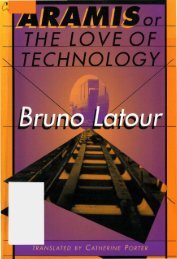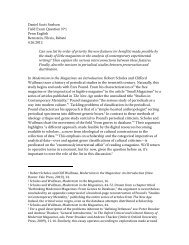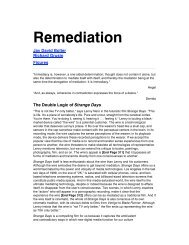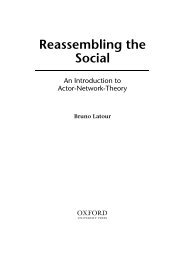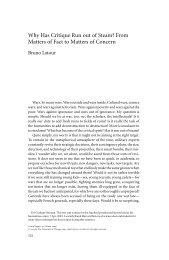The Exploit: A Theory of Networks - asounder
The Exploit: A Theory of Networks - asounder
The Exploit: A Theory of Networks - asounder
You also want an ePaper? Increase the reach of your titles
YUMPU automatically turns print PDFs into web optimized ePapers that Google loves.
Coda 153<br />
tributed network form, just as it was the undoing <strong>of</strong> a previous one?<br />
From where will appear the anti - Web? And what will it look like?<br />
Resistance is asymmetry—and this is where we part ways with Hardt<br />
and Negri—formal sameness may bring about reform, but formal incommensurability<br />
breeds revolution.<br />
Because both empire and the multitude employ the distributed<br />
network form, it is not sufficient to remain politically ambiguous on<br />
the question <strong>of</strong> distributed networks. A decision has to be made: we’re<br />
tired <strong>of</strong> rhizomes. One must not only analyze how distributed networks<br />
afford certain advantages to certain movements; one must critique<br />
the logics <strong>of</strong> distributed networks themselves. Many political thinkers<br />
today seem to think that “networked power” means simply the aggregation<br />
<strong>of</strong> powerful concerns into a networked shape, that networked<br />
power is nothing more than a network <strong>of</strong> powerful individuals. Our<br />
claim is entirely the opposite, that the materiality <strong>of</strong> networks—and<br />
above all the “open” or “free” networks—exhibits power relations regardless<br />
<strong>of</strong> powerful individuals.<br />
At this point, we pause and pose a question: Is the multitude always<br />
“human”? Can the multitude or netwars not be human and yet still be<br />
“political”? That is, are individuated human subjects always the basic unit<br />
<strong>of</strong> composition in the multitude? If not, then we must admit that forms such<br />
as the multitude, netwars, and networks exhibit unhuman as well as human<br />
characteristics.<br />
We mean such questions less as an issue about agency (the issue <strong>of</strong><br />
how to instrumentalize networks, how to use them as tools), and more<br />
as an issue about the nature <strong>of</strong> constituent power in the age <strong>of</strong> networks<br />
(the issue <strong>of</strong> the kinds <strong>of</strong> challenges that networks pose to the<br />
way we think about “politics”). If, as the saying goes, networks operate<br />
at a global level from sets <strong>of</strong> local interactions, and if one <strong>of</strong> the<br />
defining characteristics <strong>of</strong> networks is the way in which they redefine<br />
“control” in the Deleuzian sense, then we are moved to ask what inhabits<br />
the gap left open by the limitations <strong>of</strong> autonomous, causal,<br />
human agency. Nothing about networks leads us to believe that they<br />
are inherently egalitarian forms—a tendency displayed in the numerous<br />
popular - science books on networks. Not all networks are equal,



